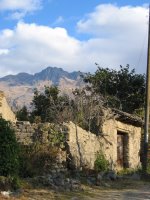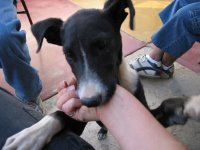
 On August 25 we left Cochabamba for our host community, a small pueblo outside of QuillaCollo. The Peace Corps emphasizes walking and frightening forms of public transportation like the rest of the community once volunteers are at project site, but for now we roll in Land Cruisers. A few are missing their side mirrors still, which get expertly swiped in the city and possibly sold back to you later.
On August 25 we left Cochabamba for our host community, a small pueblo outside of QuillaCollo. The Peace Corps emphasizes walking and frightening forms of public transportation like the rest of the community once volunteers are at project site, but for now we roll in Land Cruisers. A few are missing their side mirrors still, which get expertly swiped in the city and possibly sold back to you later.Our host community is small and poor, but barely qualifies as “the campo” (in Bolivia, there are cities, the campo, the campo-campo, and the super-campo. It’s funny until you think about your project site odds). It’s mostly an agricultural town. There is one restaurant, a bunch of tiny stores (one room in someone’s house), and a few chicherías, indicated by a white flag outside the house. Chicha is alcohol made of fermented maize and apparently, feces, because a lot of volunteers get gnarly sick off it. Probably because it´s drunk out of a gourd shared by everyone and each batch tastes a little different. No internet, but enough street dogs to take every SPCA in the states.
The volunteers are staying with families scattered across a three-mile stretch. I really lucked out because not only does my host family have a flush toilet and electric shower, but also Mama Mary owns the town restaurant. It’s open on the weekends and serves pique, beef and chorizo fried with onions over papas fritas, chicharrón, slow-stewed and fried pork, and lambreado, shake ‘n baked guinea pig. So now I’m porking up on deep-fried meals doused in spicy llajua sauce everyday. Having three brothers and getting woken up every morning at 6 by the dogs (who bark for five minutes every time someone walks by the house) or Mama Mary banshee-yelling at one of the boys has taken some getting used to. But really, no complaints because at the other end of the scale, volunteers are getting latrines, bucket baths, and boiled potatoes and rice at every meal.
Training is super regimented. 4 hours of Spanish class until noon, then another 4 of technical training after lunch. Classes are always at someone’s house in the community except on Wednesdays, when we make the hour and a half trip to the Cuerpo de Paz training center. At the training center they add cultural, medical, and safety sessions to the day, plus an intense schedule of vaccinations.
It’s an interesting time to be in Bolivia. There is a lot of change happening in Bolivia right now with the Morales presidency, drafting of the constitution, and constant educational/social/political reforms. The anti-American bit of it isn’t really encouraging, but for the most part I’m just really fascinated to watch history happen.
A popular way of political expression is the paro, or blockade. Shovel dirt, rocks, cars, and/or children (just kidding) across the most heavily used roads and protest for your cause 1-3 days or until it rains, whichever comes first. There are usually 2-3 national paros a year, and more local issue bloqueos every month. The first paro we saw was August 29, a nationwide transportista protest of the administration’s proposal to re-issue every license plate in Bolivia (and collect the money for it). Depending on the issue and the place protests and blockades get dangerous, especially for outsiders, but QuillaCollo was pretty tranquilo. I spent the day playing soccer with my little brother, which means he plays soccer and I run around after him until I get tired.
FUN FACT/QUOTE OF THE DAY: You can buy pink toilet paper on every street corner!




3 comments:
I love it - Bolivian Vivian :)
Pink toliet paper! That is awesome, I've never seen pink, does it remind you of shopping in Chinatown?
Mama bansheeyelling? I thought you'd be used to that one by now ;)
Did you say latrine? Nice little wooden bench and all :)
Post a Comment